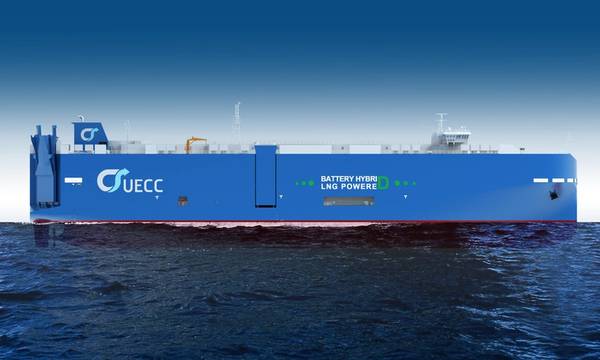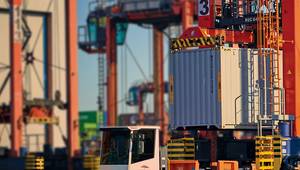
Short-sea RoRo company UECC has confirmed an option with China Ship Building Trading Co., Ltd and Jiangnan Shipyard Group Co. Ltd. for a third hybrid-battery LNG vessel, this time for use on UECC’s Atlantic short-sea trade routes.
“This order is another step in our commitment to cleaner shipping,” said Glenn Edvardsen, CEO of UECC. “Our experience with LNG dual-fuel vessels has been good, and we want to keep moving forward to expand our sustainable fleet.”
The company’s two first ECO-class vessels took first and second place in last year’s Bremenports’ Greenports Award for being the cleanest ships calling at Bremen, one of Europe’s busiest ports. The new vessel includes all the technology of these first two vessels.
The new orders will increase the number of dual-fuel LNG vessels at UECC to five. Edvardsen commented: “When our third battery-hybrid LNG PCTC is delivered in 2022, it ushers in a new era for UECC and short-sea shipping in Europe. That will give us a total of five eco-friendly vessels in our fleet. This represents more than 50 percent of the UECC-owned fleet, and no other short-sea company, or deep-sea for that matter, can demonstrate such a sustainable fleet,” adding that, “a ship is a significant and long-term investment. We wanted to expand the use of new technologies to meet or exceed future sustainability requirements, and we feel our choice with the first two LNG vessels has been justified over nearly three years of operation. This experience gives us the confidence to move forward with even more eco-friendly technologies.”
The new battery-hybrid solution will enable UECC to exceed the IMO’s target of 40 percent reduction in carbon intensity by 2030. The three vessels will also meet the IMO Tier 3 NOx emissions limitations that enter into force in the Baltic and North Seas from 2021 keel lays.
“Batteries are a key step toward next-generation sustainability,” stated Edvardsen, noting that battery power on the new vessels would improve operational efficiency and further reduce emissions through peak-shaving, in addition to handling partial accommodation load and driving auxiliary equipment. “It also provides an option for reducing emissions while in port, and that is becoming more important for many cities,” he added.




